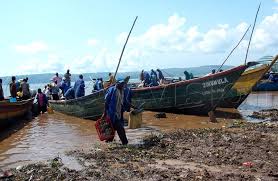KAMPALA: Lots of people at Jinja City’s Masese Landing Site residents have been forced to relocate due to the rising water levels in Lake Victoria.
The owners of numerous homes and kiosks that were used as stores had to evacuate since they were swamped. Many people in the neighborhood are afraid that hard times are coming and there seems to be no plan in place for them.
“We last registered this kind of rise in water levels at Masese in 1997 but it didn’t reach this level,” said Bumaali Kidoma a local member of the affected community. According to the Lake Victoria Basin Commission report, in May 2020, the water level in Lake Victoria reached a new record of 13.42 meters, above the 13.41 meters which was recorded in 1964.
The rise in sea level reached 13.32 meters in 2021. Water levels were 2.18 meters above this baseline during the height of the peak, according to the Global Reservoir and Lake Monitor, a NASA and US Foreign Agricultural Service-sponsored study.
For four of the past five years, heavy rainfall during the rainy season has posed a threat to the fishing communities that live near Africa’s largest lake.
During the lengthy rainy season (March to June) in the region, government authorities issued warnings to lakeside villages due to the rising waters surrounding Lake Victoria in 2020 and 2021. The Jinja power dams have some control over Lake Victoria’s water levels.
Furthermore, homes were submerged by floodwaters, which also forced tens of thousands of people to flee their properties. Besides, the Masese market has already been moved this time around since as the entire area is flooded.
Yet to be confirmed rumours suggest that residents of many islands in Jinja Southern Division, such as Lwabitooke and Kisima I and II, are also facing similar circumstances that have driven many of them to escape to the mainland.
Since a large number of people have been displaced, the locals are pleading with the government to provide food assistance. The bulk of people are seeking safety at Masese Landing Site Street as they have no food due to the flooding of their houses and gardens. For those who cannot afford to live in town, they have been left homeless.
Francis Magala , the local Masese leader called upon the Ministry of Disaster Preparedness to act quickly to assist the afflicted residents of the town. The National Fisheries Resources Research Institute (NaFIRRI) director, Dr. Winnie Nkalubo, ascribed the rising water levels to the heavy rains at Lake Victoria’s basin.
“We have so many rivers and tributaries in Kenya, Tanzania and Uganda which pour in Lake Victoria coupled with the rainy season that’s the reason the lake shores have flooded, there is too much water into the lake,” Dr Nkalubo noted. However, she believes that in the near future, Lake Victoria’s fish stocks particularly those of tilapia will rise.
READ: Charlene Ruto Named Among 100 Most Influential Young Africans with Nixon Kitimoi
“The lake shores have widened and tilapia lays eggs on Lakeshores, hence if it is not disturbed by illegal fishing we are most likely to have an increase in the stocks of tilapia this year,” she said
According to experts, the present water levels have risen over the 13.42 m historical level that was reached in 1964 at 14 m onto the mainland.

